Contents
- What Human Food Can Cats Eat?
- CAN CATS EAT YOGURT?
- CAN CATS EAT SALMON?
- CAN CATS EAT CHEESE?
- CAN CATS EAT BREAD?
- CAN CATS EAT BROCCOLI?
- CAN CATS DRINK MILK OR CREAM?
- CAN CATS EAT APPLES?
- CAN CATS EAT AVOCADO?
- CAN CATS EAT BACON?
- CAN CATS EAT BEANS?
- CAN CATS EAT BLUEBERRIES?
- CAN CATS EAT CHOCOLATE?
- CAN CATS EAT CORN?
- CAN CATS EAT DOG FOOD?
- CAN CATS EAT FAT TRIMMINGS AND BONES?
- CAN CATS EAT GARLIC?
- CAN CATS EAT HAM?
- CAN CATS EAT ONIONS?
- CAN CATS EAT PEANUT BUTTER?
- CAN CATS EAT PEANUTS?
- CAN CATS EAT PUMPKIN?
- CAN CATS EAT RAISINS?
- CAN CATS EAT RAW EGGS?
- CAN CATS EAT RICE?
- CAN CATS EAT SPINACH?
- CAN CATS EAT STRAWBERRIES?
- CAN CATS EAT TOMATOES?
- CAN CATS EAT TUNA?
- CAN CATS EAT WATERMELON?
What Human Food Can Cats Eat?
Here's a List of Some Toxic & Safe Ones!
We as humans eat many different kinds of foods and sometimes we like to give a little to our cat friends. Many always wonder if some of these foods are actually safe to give to our furry friends. That’s why we compiled this list.
Although it’s not even close to covering all of the foods out there it does least give cat owners an idea of what might be okay for their cats to consume and which foods they should definitely stay away from.
Here’s an infographic with an overview of some human foods your cat can and cannot eat:
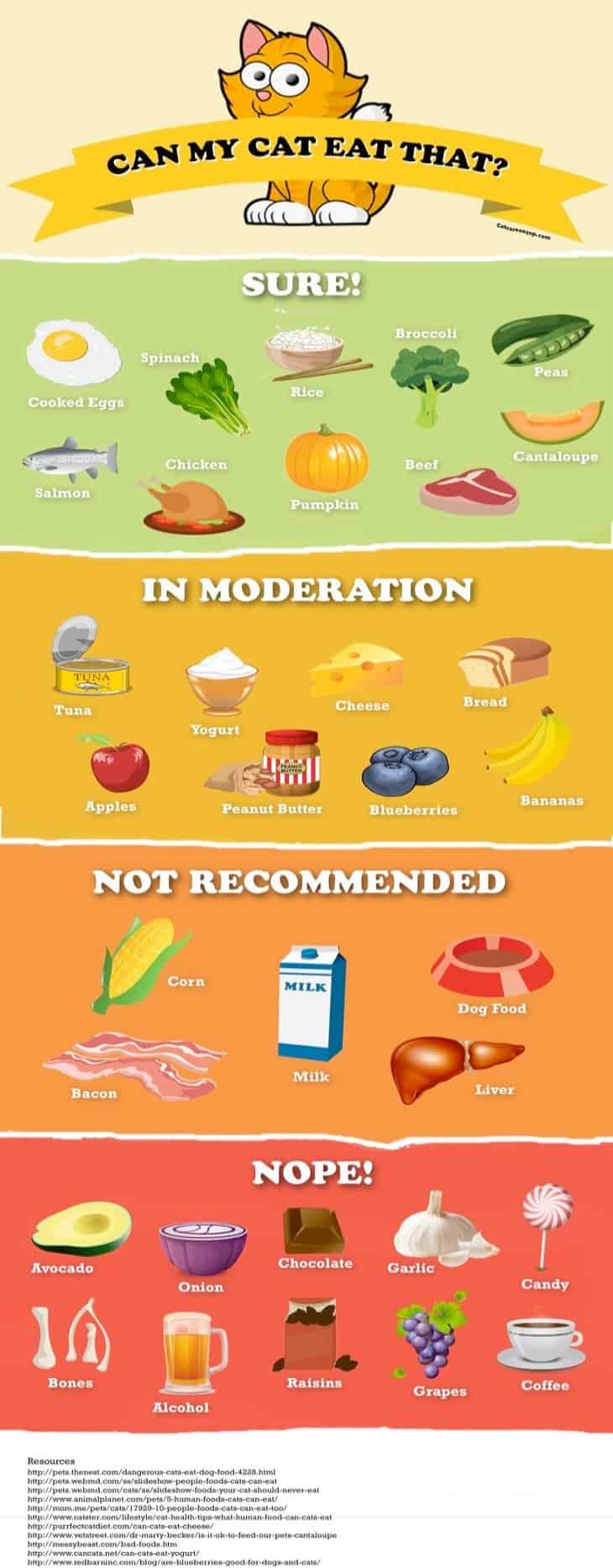
Want to use this infographic on your blog? Just copy and paste the code below!
Disclaimer: Always remember that cats function differently than humans and aren't meant to consume some foods that humans can eat. If you're ever not sure about feeding your cat a particular food, don't do it!
If your cat has consumed a food you're not sure was safe, make sure to call your veterinarian first. Lastly, always remember that some foods may be okay for some cats, but others may not do well consuming them. There always be debate over certain foods. Just remember, moderation is best!
CAN CATS EAT YOGURT?
Answer: In Moderation
Although some adult cats do suffer from lactose intolerance, your cat can eat yogurt. Yogurt is the safest dairy product to feed a cat. Cats often enjoy the flavor of yogurt, and there are some health benefits in yogurt for felines.
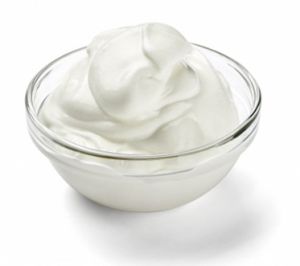
Yogurt is considered healthy for cats because of the active bacteria cultures that live inside plain yogurt. The bacteria cultures found in yogurt can boost your cat’s immune system and promote efficient digestion. Intestinal flora in bacteria cultures help a cat’s stomach and ensure healthier bowel movements
If your cat is suffering from diarrhea, then a small dose of yogurt before their main meal is recommended. Yogurt is even beneficial for our feline friends when they’ve swallowed one too many hairballs.
The key to treating your cat to yogurt now and then is to monitor their reactions to it. If your cat shows adverse reactions to a bit of yogurt, then he or she may have a strong case of lactose intolerance. Thus, you won’t want to give your furball any more yogurt. Start with a small serving of yogurt and test your kitty’s tolerance.
Yogurt is the best dairy product for adult cats to eat. Just make sure you feed your cat plain yogurt. Sugars and additives in flavored variations are sure to upset your cat’s stomach.
CAN CATS EAT SALMON?
Answer: SURE!
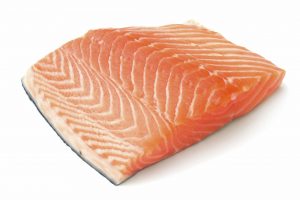 Your cat can eat salmon, but it’s not the best food for your feline. Salmon will not cause your cat to throw up or have an upset stomach. However, you should not feed your cat a diet strictly of salmon or any other fish product. No matter how much our furry friends love it.
Your cat can eat salmon, but it’s not the best food for your feline. Salmon will not cause your cat to throw up or have an upset stomach. However, you should not feed your cat a diet strictly of salmon or any other fish product. No matter how much our furry friends love it.
Fish products are fine for your cat, but they don’t have adequate nutrition for your furry friend. Your cat may come running every time he or she smells some salmon or tuna, but that doesn’t mean you can switch their diet to all fish. Cat food has all the nutrients your cat needs, like taurine and more. Fish does not have the right amount of nutrients for your cat.
There is some difference in the type of fish you feed your cat. Canned fish and raw fish both have their negatives. Parasites, additives, and more can be in some types of fish and harm your cat.
Even though your cat loves the smell and taste of salmon – it’s best to give them nibbles of salmon or tuna as a treat. And no matter how loud your feline meows, you cannot make salmon a central part of your cat’s diet.
CAN CATS EAT CHEESE?
Answer: IN MODERATION (IT DEPENDS)

Cats can eat cheese in moderation, but be careful if they’re lactose intolerant!
Cats often love cheese, and the protein in it can be good for them. The problem is many cats develop a bit of lactose intolerance as they reach adulthood. This means cheese, or any other dairy product, could cause your feline friend stomach issues and diarrhea.
If you want to give your cat cheese, then start with a subtle portion. See how your cat reacts to the cheese over the next 12-24 hours. If your feline seems fine, then you should be able to feed your cat small portions of cheese on occasion.
Portions are essential when talking about cats and cheese. While a little slice may be fine, your cat will certainly get sick if it eats too much cheese (or any dairy product). Make cheese a special treat for your cat if he or she likes it.
(Cat’s litter box full? See our clumping litter reviews)
As many cats do really like cheese, some owners have been able to use cheese to help their furry friends take medicine. Cat owners have been known to grind up medications their cats need to take and then place the powder on a small slice of cheese. This is the only way many cats will ingest the drug.
If your cat really likes cheese – just remember to start small and slow. Give your feline a little piece and make sure he or she can handle it. Cats can eat cheese, but only in moderation.
CAN CATS EAT BREAD?
Answer: IN MODERATION
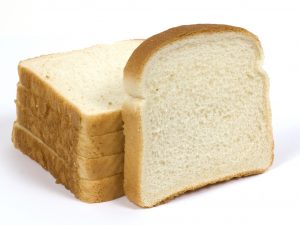
Cats can eat baked bread in moderation, but be careful of raw dough!
Cats have no issue digesting bread. Eat baked bread will provide no real problem for your cat. Nor will eating bread provide any nutritional benefit to your cat. So it’s pretty pointless to feed any bread to them. The particular nutritional needs that cats require makes bread a worthless for them.
You can give your cat some bread as a treat now and then, but it should never become a significant part of their diet. A small piece of bread will suffice. And make sure any bread you feed your cat is not covered in sauces or spreads like jelly or peanut butter.
Cats can eat bread, but make sure to do so in moderation. If your cat likes bread, then give them a small piece as a treat now and then.
*One important note – bread dough can be terrible for your cat. You should never allow your cat to eat bread dough. Furthermore, if your cat does somehow eat some bread dough, you should take them to the veterinary as fast as possible. Bread dough can rise in a cat’s stomach and create many health issues. These issues will occur rapidly after the dough has been consumed.
CAN CATS EAT BROCCOLI?
Answer: SURE!
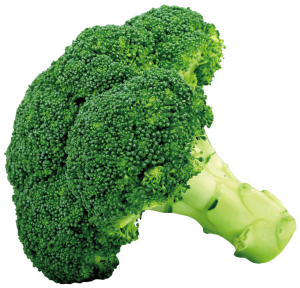 Your cat can eat broccoli. Whether your furry friend would want a piece of broccoli is a different story. This vegetable is completely safe for your cat to consume, but don’t be surprised if he or she has no interest in the leafy green.
Your cat can eat broccoli. Whether your furry friend would want a piece of broccoli is a different story. This vegetable is completely safe for your cat to consume, but don’t be surprised if he or she has no interest in the leafy green.
While your cat may not want to eat broccoli, if he or she does like broccoli then you can feed it to them often. Broccoli offers some health benefits to your cat, including being packed with anti-oxidants and being an excellent source of roughage for you cat.
Cats may be attracted to broccoli when they have a stomach ache. In a similar manner to how grass and other leafy greens seem healing to them in times of stomach pain – broccoli does, too. Don’t think that because your cat ate broccoli and then threw up it is not good for them. There’s a high chance the cat’s stomach was already in disarray if he or she wanted broccoli.
Feed your cat broccoli if you like. As with any human food, you should start with a small portion and work your way up.
CAN CATS DRINK MILK OR CREAM?
Answer: IT DEPENDS (NOT RECOMMENDED FOR ADULT CATS)

There are many variables to consider before serving milk or cream to your cat.
In most cases, an adult cat should not drink milk or cream. This seems counterintuitive as images of cats lapping up milk is seen all over. While kittens can drink milk when they’re born, an adult cat is likely to have some lactose intolerance.
Milk is an incredible source of energy for young cats, but the enzyme that allows cats to digest milk disappears from their gut as they age. This creates lactose intolerance in most adult cats.
Even though milk may upset the stomach of an adult cat – many felines still love to lap up milk. The flavor of milk is preferable to most cats and the fat in the milk is good for them. This doesn’t mean you should give your cat much milk, it’s still best for them to drink water.
Avoid allowing your cat to consume milk as much as possible. A few sips now and then are okay for your furry friend, but anything more than that will usually lead to a stomach ache.
The less milk or cream your cat consumes – the better.
CAN CATS EAT APPLES?
Answer: IN MODERATION (BUT BE CAREFUL OF THE SEEDS/CORE)
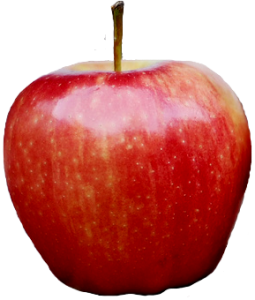
Cats can eat apples. In moderation, apples are one of the healthier people foods for your furry friend. The key is to never, ever feed your cat the core of an apple. The seeds contain cyanide, which can be very harmful to your animal. An apple core can poison your feline.
Don’t let this scare you from feeding your cat a little apple on occasion. Just keep the portions relatively mediocre and avoid the core. Apples are healthy for cats because they contain many vitamins and nutrients, like calcium, vitamin C, vitamin K, and pectin. The phytonutrients in the skin of an apple are also great for your cat.
Not only are apples good for your kitty – many cats love the taste of apples. Don’t be afraid to give your cat a slice or two of an apple as a treat or as a topping on their cat food, especially if he or she takes a liking to the fruit.
There are a few cat foods that contain apples, but a few fresh slices to munch on is better for your feline. Just keep it to a few, as the sugar in an apple can cause a stomach ache in a cat’s stomach.
CAN CATS EAT AVOCADO?
Answer: NO.
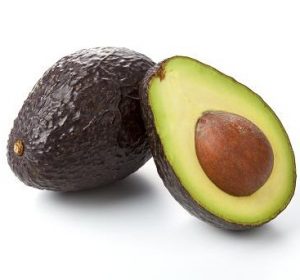
It is not safe to feed your cat avocado!
You should never feed your cat avocado. Cats cannot eat avocados. This is because avocados contain a toxin called persin. This toxin has no effect on people, but can be horrible for your cat.
Some avocados have more persin in them than others do. Guatemalan avocados are known to contain a high level of persin. The time of year avocados are grown, and the conditions play a significant role in the amount of persin in the avocado.
The problem is it’s hard to tell how much persin will be in an avocado. While some avocados may not harm you cat at all, the risk is not worth it. Just avoiding feeding your furry friend avocados and you’ll be okay.
If your cat does consume some avocado or the leaves, bark, or stem of the avocado tree, you’ll want to get in touch with your vet immediately. Too much avocado could lead to the death of a cat. A little bit can lead to difficulty breathing, high fever, and more.
CAN CATS EAT BACON?
Answer: NOT RECOMMENDED.
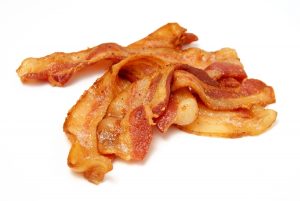 Cats should avoid eating bacon. While bacon is not dangerous for cats, it is not good for them. The problem is that bacon is salty and filled with preservatives. By adding salt and preservatives to your cat’s diet, you may upset their stomachs in the present and cause health issues down the road.
Cats should avoid eating bacon. While bacon is not dangerous for cats, it is not good for them. The problem is that bacon is salty and filled with preservatives. By adding salt and preservatives to your cat’s diet, you may upset their stomachs in the present and cause health issues down the road.
This may surprise some cat owners because bacon is a pork product. Pork is perfectly fine for a cat to eat. However, the pork you feed your cat must be untreated. Pork in the form of bacon or low-quality ham should be avoided by your cat at all costs.
Your cat may enjoy the smell of bacon and may coming nudging your leg as you indulge in the delectable meat. If you allow your cat to eat bacon, he or she will. The smell of the meat is intriguing to many cats just like it is to many humans. If you care about your cat’s health, then you will not let them eat bacon. There are many other human foods you can use as a treat.
CAN CATS EAT BEANS?
Answer: IN MODERATION
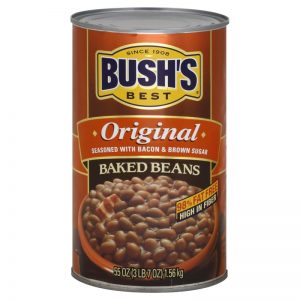
You can feed your cat beans. The key, as with most human foods, is to feed your cat beans in moderation. The interesting thing about cats is that many of them enjoy eating beans, especially baked beans.
Beans are a food high in protein. As protein is the most important aspect of your cat’s diet – beans can be very healthy for your cat. However, you must remember that cats are carnivores. They need meat to be as strong and healthy as they can be.
As such, you shouldn’t make beans a main staple in your cat’s diet. Sure, you can feed your furry friend some baked beans as a treat now and then. Just don’t make a habit out of it. As well, you’ll want to always cook any beans you plan to feed your feline.
Start with small portions and see how your cat reacts. If they seem okay, you can feed your cat a little more beans each time you have them. Luckily, cat’s stomachs don’t react to beans in the same way human stomachs do.
CAN CATS EAT BLUEBERRIES?
Answer: IN MODERATION.
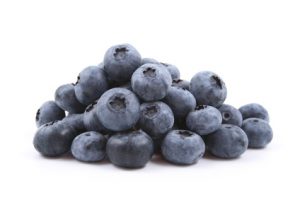
Your cat can eat blueberries. There’s no reason your furry friend can’t go on a health kick with you and down some berries. Just remember a few blueberries is enough for your cat.
Blueberries should be a treat for your cat – not a main staple of their diet. A couple of blueberries every few days is all your cat will need to get the nutritional benefits of the fruit. Vitamin C is great for your cat (and not a part of their regular diet), and blueberries are rich in the nutrient.
Many cat foods have blueberry extract included due to the nutrients of the fruit and the flavor. The antioxidants in blueberries also are great for your cat and help persevere cat food.
Feed your cat some blueberries, but just like any other human food – start small when introducing blueberries to your cat’s diet and monitor changes. Blueberries certainly are a cat-safe fruit.
CAN CATS EAT CHOCOLATE?
Answer: NO.
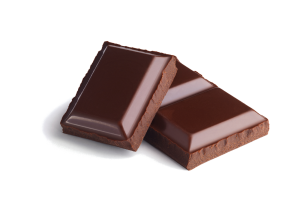
Just like dogs – cats can’t eat chocolate. You should never feed your cat chocolate. Too much chocolate can kill your cat. Even a few chocolate chips can cause severe stomach pain for your furry friend.
Chocolate is made from cacao and contains compound by the name of theobromine. This mixture can cause a cat to:
- Lose bodily fluids
- Have an upset stomach
- Increase in heart rate
- Nervous system breakdown
Overall, your cat may begin to vomit or have diarrhea after eating chocolate. Seizures are also common. If your cat binges on chocolate, then he or she could fall into a coma or die.
The severity of your cat’s reaction to eating chocolate will depend on the type of chocolate and how much was consumed. Darker chocolates contain more cacao and are usually much worse for your cat.
Never feed your furry friend chocolate. If you think your cat has consumed chocolate – you should immediately take them to the vet.
CAN CATS EAT CORN?
Answer: NOT RECOMMENDED.
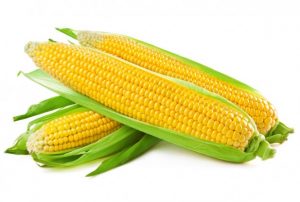
Technically – your cat can eat corn. This doesn’t mean you should feed your cat corn. Corn is not healthy for you cat, as it is a grain and a poor source of protein. Not only that, but most of the corn grown in the United States is genetically modified. Genetically modified foods are dangerous for your furry friend.
While many cat foods include corn, it’s only included because corn is cheaper than high quality ingredients. Corn has no nutritional benefit for cats and is just used as a filler in low-quality cat food.
A diet high in corn can lead to obesity, diabetes, and digestive disorders in cats. Cat food that uses corn as their primary source of protein can also result in organ diseases in many felines. As well, many cats that have suffered from skin and coat problems is directly related to too much corn in their diet.
While your cat can consume corn, it is not recommended to feed your cat corn. Consider an alternative food for your cat.
CAN CATS EAT DOG FOOD?
Answer: IT WON’T HURT YOUR CAT, BUT IT’S NOT RECOMMENDED
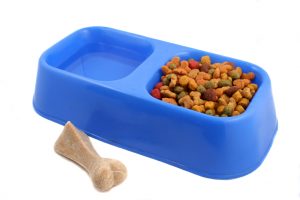
Your cat can eat dog food. Dog food will not make your cat sick. Nor will you need to rush your furry friend to the vet after chomping down on some dog food. However, you should not try to feed your cat dog food.
Cats and dogs have different nutritional requirements. While it won’t hurt your cat to sneak some food out of the dog bowl now and then, you should not allow this to become standard practice. Dog food is created to cover all the nutritional needs of dogs. Cat food is designed to cover all the nutritional needs of cats.
Cat food uses a different form of vitamin A and a few other minerals than dog food does. This is due to the unique nutritional needs of cats. Cats are carnivores and need a diet strict in protein to survive. Dogs are omnivores and can eat a diet based on meats and plant-based foods.
A quick nibble of dog food will have no adverse effect on your cat. A diet of strictly dog food can lead to blindness and ultimately, the death of your furry friend. Avoid feeding you cat dog food on a consistent basis.
CAN CATS EAT FAT TRIMMINGS AND BONES?
Answer: NO.
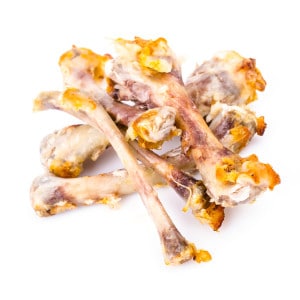
Your cat should not eat fat trimmings and bones. Neither will add any nutritional benefit to your cat’s diet, but both of these human foods can cause severe problems to the health of your feline.
It’s not that your furry friend can’t eat fat trimmings. Fat trimmings could be ok for your cat – except they can cause pancreatitis for your cat. As well, a cat that eats fat trimmings has a chance of contracting salmonella or E.coli. Vomiting and diarrhea are also a possibility.
Bones are also a no-go for your cat. While your cat’s digestive system won’t have too many issues with a bone on occasion (cats do it rats whole) – the splinters a cooked bone is sure to possess can easily puncture your cat’s digestive tract as they chew on them.
While you may be able to get away with giving your cat a bone with trimmings now and then – it’s best to avoid this practice due to all the health risks.
Keep your cat healthy and throw the bones and fat trimmings in the trash can, not on the floor.
CAN CATS EAT GARLIC?
Answer: NO.
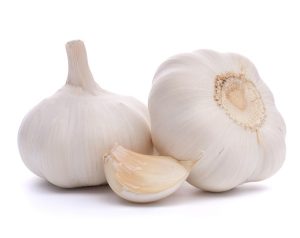
Cats cannot eat garlic. You should avoid feeding garlic to your cat. However, this can be harder than some people suspect. As humans, we enjoy using flavors like garlic to spice our foods. Sometimes we may be enjoying a meal and forget garlic is on our food. Then our furry friend comes around, and one meow is all it takes to get a treat from the table.
You must remember not to give your cat food from the table that was seasoned with garlic. Garlic comes from a species of plants called Allium. All Allium plants (garlic, onions, leeks, etc.) are toxic to your furry friends.
If your cat ingests garlic, he or she may face symptoms like lethargy, weakness, pale gums, vomiting, diarrhea, and more. In severe cases, you cat could suffer organ failure and quite possibly, death.
If you believe your cat has consumed garlic, you should call the vet quickly. When caught early, a vet can induce vomiting and ensure you cat is ok. A blood transfusion can be needed in the worst cases.
The best thing you can do is make sure you don’t feed your cat any garlic.
CAN CATS EAT HAM?
Answer: IN MODERATION (BUT AVOID LOW QUALITY HAM WITH PRESERVATIVES)
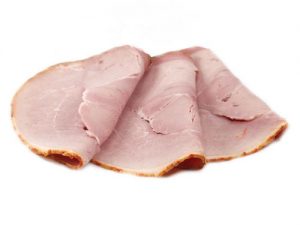
Cats can eat ham, but it depends on the situation. Much like other popular human food – there are a few factors to consider when feeding your cat ham. To begin, you cannot feed your cat low-quality ham. Low-quality ham has way too many preservatives for your furry friend.
You can feed your cat high quality ham from a reputable local butcher. A small portion of choice cut ham is perfectly fine for you cat. Just remember the “small” part of that sentence. Moderation is often a vital part of the plan when feeding cats with people food. You’ll also want to test and see how your cat reacts to a tiny portion of ham before you give him or her more.
While ham has little nutritional benefit for cats (aside from a bit of protein), your cat may savor the flavor of ham. Many cats do enjoy the taste of this meat just like humans do. Just be careful about the quality. The harmful additives in cheaper hams can lead to health problems like hypernatremia down the road.
CAN CATS EAT ONIONS?
Answer: NO.
Your cat cannot eat onion. Onions are terrible for your cat. Onions are one of the vegetables that are poisonous to your cat. They contain thiosulphate, an ingredient that is toxic to cats.
When you cat ingests an onion, they usually will go into a state of hemolytic anemia. As this happens, a cat’s body will begin to suffer. Vomiting, diarrhea, lethargy, and breathlessness can all take place. Your feline may lose all interest in eating after consuming an onion. These symptoms may occur over the course of two to four days after the onion is consumed.
While you should never give your cat an onion to eat, you need to be wary of foods that contain onion as well. Foods like pizza sauce, Chinese food, and even baby foods can have onion in them.
If you furry friend does consume an onion, call you vet. Treating your cat after eating an onion is no problem, but time is of the essence. Call the vet immediately when you notice something going wrong.
CAN CATS EAT PEANUT BUTTER?
Answer: IN MODERATION.
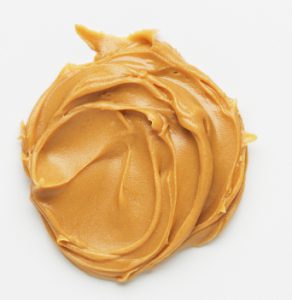 Your cat can eat peanut butter. The key is to keep the portions small. However, you may find your cat has no real interest in consuming peanut butter. Dogs often love peanut butter, but most cats do not.
Your cat can eat peanut butter. The key is to keep the portions small. However, you may find your cat has no real interest in consuming peanut butter. Dogs often love peanut butter, but most cats do not.
If you cat does enjoy peanut butter, then you can offer them a taste when you please. Peanut butter is high in protein and fat, which your furry friend needs. The issue is peanut butter is not an animal-based protein source. As such, it’s not that beneficial when included in a cat’s diet.
Give your cat some peanut butter and see if he or she enjoys it. Just make sure to keep things in moderation. Too much peanut butter may cause your cat to vomit or have diarrhea (due to the sugar). Also, you should be aware that peanut butter can get stuck to the top of your cat’s mouth and cause them to choke.
Put a bit of peanut butter on the tip of your finger and see if your cat likes it. If so, you can feed your cat peanut butter in this manner as a treat.
CAN CATS EAT PEANUTS?
Answer: IN MODERATION.

Your furry friend can nibble on a few peanuts. Cats have no issues digesting peanuts. Many felines even really enjoy the flavor of the nut. As with most human foods, you should only feed your cat peanuts in moderation.
A cat’s stomach can only break down small amounts of fat at one time. As peanuts are high in fat, your cat’s stomach can only handle so many of them. A few peanuts are great, but too many will give your cat a stomach ache.
The good news is that peanuts contain a high amount of protein, which is essential to your cat’s diet. Never feed the shell to your cat. The tough outer husk is dangerous to a kitty’s stomach. Make sure to only give your cat raw peanuts. Salted peanuts have too much salt for a feline and any other additive used to flavor peanuts will have too much sugar or spice.
Slice a few peanuts into small portions and see if your furry friends likes them. If so, you can give your cat this nutty treat now and then.
CAN CATS EAT PUMPKIN?
Answer: YES!
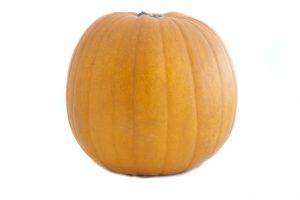
Surprisingly, you can feed your cat pumpkin. Cats often enjoy the taste of pumpkin and will quickly take to canned pumpkin without additives, baked fresh pumpkin, or roasted pumpkin seeds without salt or spices. These options are all excellent for your cat to eat.
You won’t want to let your cat eat canned pumpkin with additives, raw pumpkin, or any part of the skin or stem. As with any human food you choose to feed your cat – you’ll want to start with tiny portions and keep treats in moderation.
Pumpkin has many health benefits for felines. Many cats find pumping helps their digestive tract and can cure diarrhea. Pumpkin can also help cats with weight control issues. As well, pumpkins are packed with nutrients that cats need. Vitamins A, C, and E are all found in pumpkins, along with calcium, iron, and some other minerals.
Pumpkin is one of the healthier people foods you can feed your cat. Stick to the three forms of pumpkin that your cat can eat and you shouldn’t have any issues.
CAN CATS EAT RAISINS?
Answer: NO.
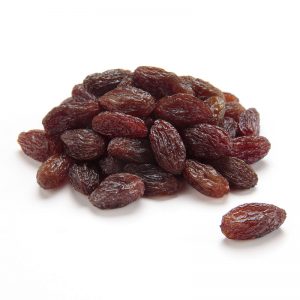
One of the worst foods for your cat to eat is raisins. Even a small portion of raisins can cause kidney failure in your cat. If your cat ever eats some raisins, you should immediately get in contact with your vet.
Your cat could suffer from acute kidney damage or actual kidney failure just by eating a couple of raisins. Some cats experience worse reactions to consuming raisins than others, but it’s best just to avoid giving them to your feline.
The problems with raisins and cats come from a little toxic substance that is found in the fleshy area of a grape. Raisins are grapes without the water weight and contain up to five times as much of the toxic chemical per gram compared to grapes.
Your cat probably will not want to eat a raisin by itself. However, some breakfast bread (especially around the holidays) will have raisins in them. Your cat may want to try these due to the smell, and you must remember that raisins are bad for a cat.
Even with small portions – you should never feed your cat raisins.
CAN CATS EAT RAW EGGS?
Answer: SURE, JUST MAKE SURE TO COOK THEM.
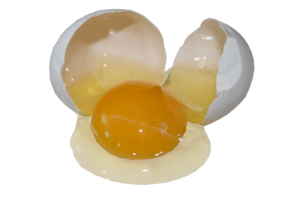
Cats can eat eggs, but they cannot at the same time. Cooked eggs are a great source of protein! Raw egg yolks are not a problem for cats in small portions. Raw egg whites are bad for cats. You should never allow your cat to consume raw egg whites.
Raw egg yolks are good for your cat because they are nutrient-rich and feature many proteins and amino acids that your cat needs in his or her diet. While you’ll want to consult with your vet before feeding your cat raw egg yolks, they should be okay in moderation.
Raw egg whites are a different story. Without getting into the science behind it – your cat may suffer from a loss of energy and the ability to absorb nutrients when consuming raw egg whites. Long-term consumption of raw egg whites can cause your cat many problems down the road, including fur and skin issues.
If you want to feed your cat raw egg yolks – make sure to pay close attention. Spread the parts apart and make sure no whites remain with the yolk before feeding your furry friend. Make raw egg yolks a special treat and not a central component of your cat’s diet.
CAN CATS EAT RICE?
Answer: YES!

Your cat can eat rice. Moderate portions of rice will help your furry friend with digestion and provide carbohydrates needed for energy. Rice is one of the easiest grains for your cat to digest.
The key is never to feed your cat uncooked rice. Uncooked rice can make your cat’s stomach bloat and cause pain. Plus, your feline won’t enjoy eating uncooked rice much. Just make sure the rice is fully cooked and you’re all set.
Another important note regarding cats and rice is that your cat is first and foremost a carnivore. They need meat and a lot of it. If your cat eats too much rice and has no room left in their little stomach for meat, then they are not eating a healthy diet. Too much rice can lead to a malnourished cat rather quickly.
Feed your cat a lot of meat and keep you cat’s rice intake in moderation – you shouldn’t have any issues.
CAN CATS EAT SPINACH?
Answer: YES!
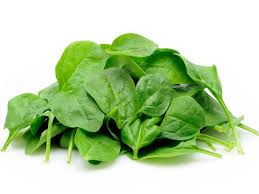
Your cat can eat spinach. Spinach is one of the best ways to introduce some greens into the diet of your furry friend. Spinach contains nearly every vitamin and mineral you can think of, along with glycoglycerolipids – which have been shown to protect the digestive tract from inflammation damages in cats.
Your cat may or may not want to eat spinach, but you can offer it to them. Cat’s are carnivores, and plant-based foods cannot be a principal part of their diets. However, a little spinach now and then can do your cat some good. Start with a small leaf or three and see how your cat reacts to it.
Your cat can eat spinach – whether he or she wants to is a different story. As always, you should keep the portions small for your feline.
*One item of note: any cats with kidney issues or problems urinating should avoid Spinach. Spinach contains calcium oxalates within its green leaves. This can contribute to crystals forming in the urinary tract.
CAN CATS EAT STRAWBERRIES?
Answer: IN MODERATION.
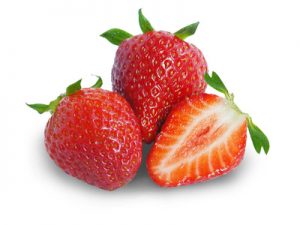 Luckily, cats can eat strawberries. One of the most delicious fruits known to man – strawberries are not toxic for your furry friend. Your cat can grab a sweet treat from the strawberries growing in your garden or when you offer up a snack. There are no issues with cats eating strawberries, but portion control is always important.
Luckily, cats can eat strawberries. One of the most delicious fruits known to man – strawberries are not toxic for your furry friend. Your cat can grab a sweet treat from the strawberries growing in your garden or when you offer up a snack. There are no issues with cats eating strawberries, but portion control is always important.
While your cat can eat strawberries, there is little to no nutritional benefit for your feline to eat the fruit. Strawberries do not contain any proteins, but they do have a few antioxidants that your cat may benefit from. The problem is your cat won’t be able to eat enough strawberries to see many advantages from these nutrients.
A few nibbles of strawberry should be all your cat needs. Strawberries are high in sugar, and your cat’s stomach could get upset if he or she eats too much strawberry. Even if your cat gorges on strawberries, you won’t have much of an issue and certainly won’t have any need to call the vet.
Overall – feel free to give your cat some strawberries even now and then.
CAN CATS EAT TOMATOES?
Answer: NO.
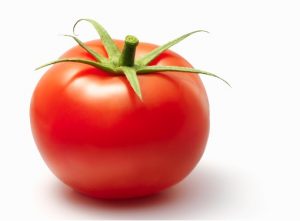
Cats should not eat tomatoes. Some speculate that when the tomato is ripe, a cat will not get sick from eating a bit of it. I wouldn’t take that chance with your furry friend.
Tomatoes contain solanine. Solanine is poisonous to cats. As the tomato ripens, there is less and less solanine in the tomato. This means it less likely your cat will get sick from a tomato. Cooking a tomato also removes a lot of the solanine. This is why some cat food contains tomato juice.
That being said even a little solanine can cause your feline some stomach problems. As well, if a cat ingests any green part of a tomato or the tomato plant – the kitty has a high likelihood of getting sick. Solanine is not poisonous enough to kill a cat in small quantities, but it can cause some stomach pain for your furry friend.
It’s best to stay on the safe side and never feed your cat any tomato product. By doing so, you ensure your cat doesn’t get a stomach ache from the poison.
CAN CATS EAT TUNA?
Answer: IN MODERATION.
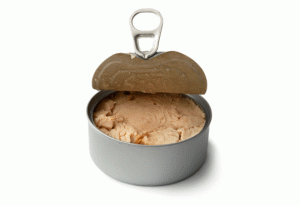
Cats can eat tuna. You can give your furry friend some tuna as a treat. The key to feeding your cat some tuna is to keep things in moderation. A small portion of tuna is all your cat needs.
Tuna is an excellent source of protein and omega fatty acids for your feline, but many cats like tuna so much that they can become addicted. There’s a reason your cat meows when he or she smells tuna – they love it!
The problem is tuna does not contain all the nutrients cats need. Cat food is truly the only source of nutrients that covers every base for your furry friend. If you feed your cat a diet consisting of only tuna – he or she will face severe health consequences sooner or later.
Also – be careful feeding your cat canned tuna. Canned tuna contains a lot of oil and salt, which should be avoided as much as possible. If you want to treat your favorite feline to a tuna treat – make sure you buy canned tuna with no salt added.
CAN CATS EAT WATERMELON?
Answer: IN MODERATION! (JUST REMOVE THE SEEDS)
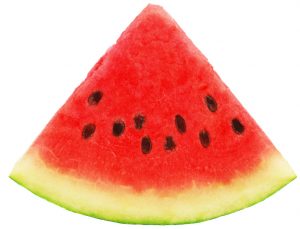
Cats can eat watermelon – as long as the seeds are removed. The seeds in a watermelon contain compounds that can be extremely dangerous to a cat. And while some cats enjoy eating watermelon, many do not.
As with any human food you feed to your cat, you should start with limited qualities to begin. Watermelon does have a lot of sugar in it, and too much could upset your cat’s stomach. This makes the fruit one to avoid for a cat who suffers from diabetes.
Watermelon does offer some nutritional benefits for you furry friend. As watermelon is filled with water – your furry friend will rehydrate while chomping down. No cat food products contain watermelon, so you’ll be adding nutrients to your furball’s diet. The fruit contains a lot of Vitamin A and C, along with minerals like potassium and magnesium.
If you cat eats too many watermelon seeds, you may be on your way to the vet. Remove the seeds and your cat can eat watermelon with no issue. On a hot summer day – there may be no better treat for your cat, or you.
Hopefully this answered the questions of “What kind of foods can my cat eat”? Always be wary of what you’re feeding your cat no matter if it’s okay to feed them it or not. Remember, they’re animals and their bodies act differently. If your cat seems to be using the litter box more than normal, make sure to contact your veterinarian right away.
Hope you enjoyed this article, make sure to leave a comment 🙂

